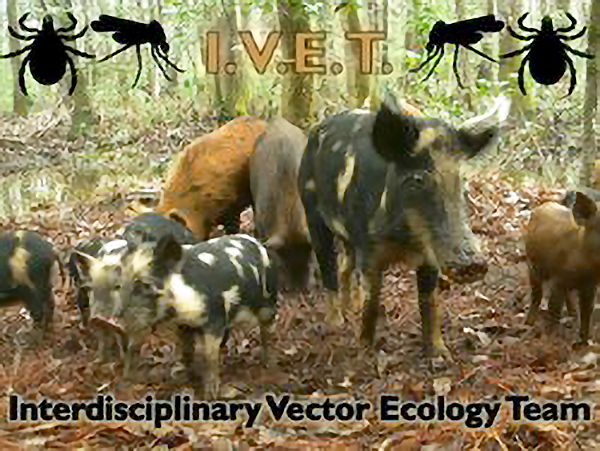Teaming for Interdisciplinary Research Pre-Seed Program
Interdisciplinary approaches to evaluate ecological relationships between invasive mammals and vector habitats

Interdisciplinary approaches to evaluate ecological relationships between invasive mammals and vector habitats

Wild pigs are invasive, non-native mammals that are widespread throughout the United States and have profound impacts on native habitats, including flora and habitat destruction via rooting behaviors and the creation of wallows. These habitat changes can directly influence arthropod diversity via local changes of environment-such as effects on grasses, bushes, and other plant communities which can increase questing structure for ticks, as well as an increase in potential ovipositing sites for mosquitos and midges. Furthermore, wallows may draw additional wildlife species to the area to use water sources, resulting in a diverse microbial community. These factors can increase risk of exposure to various vectors and subsequent pathogen transmission to wildlife, domestic/agricultural animals, and humans. To investigate the relationship between habitat changes caused by wild pigs and arthropod vectors, we plan to:
- Survey the diversity of ticks, mosquitoes, and midges, as well as microbes and plants in and around wild pig wallows.
- Investigate the microbial communities of wallows for infectious pathogens as well as factors that may influence preferential arthropod ovipositing.
- Compare species assemblages, within different ecozones, in areas disturbed with wallows and intact habitats without wallows.
- Quantify the amount of disturbance around wallows and correlate that with the abundance/density of relevant vector species.
- Use vector blood meal analyses and wildlife trap cameras to ascertain wildlife use of wallows and their degree of exposure to vectors. Where possible, we will perform pathogen analyses using blood meals and vectors.
The results of this work will inform on the surveillance and management of zoonotic (animal to human) pathogens, vector-borne pathogen ecology, microbial ecology, and the impacts of invasive mammals on pathogen transmission.
Team Lead
Christopher Cleveland
ccleve@uga.edu
College: College of Veterinary Medicine
Department: College of Veterinary Medicine
Team Members
Michael Yabsley
myabsley@uga.edu
College: Warnell School of Forestry and Natural Resources/ College of Veterinary Medicine
Department: Department of Population Health – Southeastern Cooperative Wildlife Disease Study
James Beasley
beasley@srel.uga.edu
College: Savannah River Ecology Laboratory/Warnell School of Forestry and Natural Resources
Department: Savannah River Ecology Laboratory
Daniel Peach
Daniel.Peach@uga.edu
College: College of Veterinary Medicine/ Savannah River Ecology Laboratory
Department: Infectious Diseases/ Savannah River Ecology Laboratory
Ellen Haynes
ellen.haynes@uga.edu
College: College of Veterinary Medicine
Department: Department of Population Health – Southeastern Cooperative Wildlife Disease Study
Erin Lipp
elipp@uga.edu
College: College of Public Health
Department: Department of Environmental Health Science
